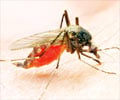The candidate malaria vaccine RTS, S/AS01 has lower efficacy in those highly exposed to the Plasmodium falciparum parasite.

- Several vaccines are being evaluated to prevent falciparum malaria
- A forerunner among these is the RTS, S/AS01 malaria vaccine, which is in clinical trials
- The vaccine’s effectiveness appears to reduce in subsequent years
Nearly half of the world’s population is at risk of malaria. Children under the age of 5 are particularly susceptible to malaria infection, illness and deaths. Early diagnosis and prompt treatment could prevent malaria deaths.
There was a concern that the vaccine could have a negative effect as the time passes. Therefore researchers studied the effect of the vaccine over seven years and published their results in The New England Journal of Medicine. Though the duration of the study was longer, the number of children studied was comparatively much less than the above-mentioned study.
The study included data from 447 African children from Kenya who were vaccinated when they were between 5 to 17 months of age. Some children received the malaria vaccine, while others received the rabies vaccine and were used for comparison. Blood tests were carried out regularly to detect the presence of the malarial parasite.
The present study was conducted to check if there is a possibility of a rebound effect on long-term follow-up after administration of the vaccine. The researchers found the following:
- The efficacy of the vaccine against the first episode of clinical malaria was 27%
- The efficacy of the vaccine against all episodes of clinical malaria was estimated at 4.4%
- The efficacy of the vaccine reduced from 35.9% in the first year to 3.6% in the seventh year
- A negative efficacy was observed in the high-exposure group in the year 5 of the study
- The estimated number of cases of malaria prevented due to the vaccine over 7 years were 317 cases per 1000 children
Reference:
- Olotu A et al. Seven-Year Efficacy of RTS,S/AS01 Malaria Vaccine among Young African Children. N Engl J Med 2016; 374:2519-2529















